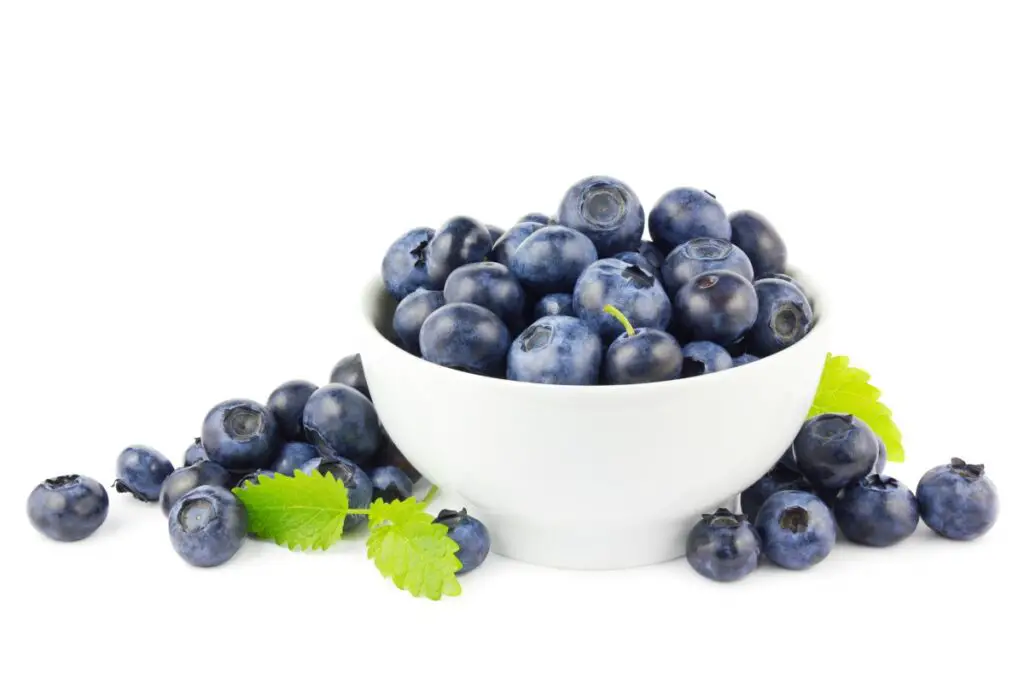Sometimes when eating blueberries a few roll off my plate and land on the floor. Quickly, I pick them up before my English comes by to eat them. This got me thinking, can English bulldogs eat blueberries?
English bulldogs can eat fresh or frozen blueberries in moderation as long as they are not allergic to them. A good serving size for bulldogs is ten blueberries. Blueberries contain vitamins B and C and are high in fiber, all of which are healthy for bulldogs.
If you’re looking for natural, healthy ways to spice up your English bulldog’s diet, why not try adding fruits? Certain fruits can be beneficial to your pooch’s health, and one such fruit is blueberries. This sweet, tasty fruit is rich in several vitamins such as vitamins A, C, E, and K. Apart from these vitamins, blueberries also contain fiber, manganese, copper, and plenty of antioxidants. And now you know why they are among the most consumed fruits in the United States.

5 health benefits your bulldog can get from blueberries
Improved immune system
According to Healthline, blueberries are the “king” of antioxidant foods. Antioxidants help protect the body from free radicals, which are unstable molecules capable of damaging the body’s cells leading to aging and other dangerous infections, like cancer. And yes, your dog can get cancer too. In short, feeding berries to your dogs might directly increase their antioxidant levels and keep your dog’s cells healthy.
Support digestion
As an excellent source of fiber, eating these berries can help relieve constipation as well as keep your dog’s overall digestive system healthy. Also, the vitamins, copper, sodium, fructose, and acids available in this fruit can help stimulation of digestive and gastric juices, hence enabling food to move efficiently through the gastrointestinal system.
Strong dog bones
If there’s one nutritional value of these berries that sticks out it is the availability of Vitamin K. According to Healthline, a single cup (148 grams) of these nutrient-dense berries contains up to 36 percent of Reference Daily Intake (RDI) of this vitamin. And as we all know, vitamin K is essential in promoting the growth of healthy bones. Therefore, if you own an old bulldog, feeding him blueberries might help maintain healthy bone density. Also, you should supplement his diet with other vitamin K-rich foods such as celery, cucumbers, and carrots.
Healthy heart
Dogs tend to have a lot of cholesterol buildup as they age, which is why introducing blueberries to your dog’s diet can be a great way to keep your bulldog’s heart-healthy. This exotic fruit can naturally lower the oxidized LDL cholesterol. Additionally, research shows that berries play a very vital role in lowering blood pressure. All these factors can lead to a healthy dog heart.
Improved memory and brain function
Oxidative stress in dogs with heart failure can accelerate the overall aging process of the brain, thereby affecting the brain function negatively. According to animal studies, berries contain antioxidants that can affect the brain areas responsible for intelligence. Overall, the aging neurons appear to benefit a lot from these tasty berries, leading to cell signaling improvement.
All in all, it’s completely safe to feed your dog either fresh or frozen blueberries. However, as with any other treat, this should be done in moderation. These fruits are small, so there is no need to cut them into pieces. But be watchful of potential risks like chocking in smaller dogs. And it’s always good to check with your dog’s vet first, before introducing any new foods, even blueberries, to your bulldog’s diet.
Side effects that can be caused by blueberries
Many dogs love eating berries, and most of the time, they don’t experience any adverse side effects. But, something good must also have its downsides. So if you suspect that your bulldog has taken more than enough, you should keep an eye for the following side effects:
Constipation
Since berries are a rich source of soluble fiber, they can cause constipation in both humans and dogs. Soluble fiber absorbs water, unlike insoluble fiber. And a lack of enough water in the body might lead to constipation. The best thing to do in such a scenario is to give your dog more water to drink. That should solve the problem, but if it persists, you might need to check with your vet and get an appropriate laxative for your dog.
Diarrhea
On the other hand, if your bulldog drinks more than enough water, you should expect diarrhea. Therefore, blueberries should be given in moderation.
Tooth decay
If you take a keen look at the blueberry’s nutritional breakdown, you’ll notice that they contain high amounts of sugar. A single cup of these sweet fruits contains about 15 grams of sugar. Therefore, it’s always a wise idea not to let your pooch take too much in one sitting as this might accelerate decay of your dog’s teeth. According to the AKC, it’s vital that you clean your dog’s teeth to avoid bad breath, tooth decay, and bleeding gums.
How many blueberries are enough for your bulldog to eat in one sitting?
As we have discussed earlier in this post, pooch treats should be done in moderation to avoid gastrointestinal upset. All treats, including berries, shouldn’t make up more than 10 percent of your bulldog’s daily diet. Experts also suggest the ‘1 pound, 1-blueberry’ rule, which means if your dog weighs ten pounds, then it’s recommended to give him no more than ten blueberries per day.
How to prepare and feed your English bulldog blueberries
First and foremost, all vegetables and fruits should be thoroughly washed to remove any dirt or pesticides before feeding them to your dog. After washing them, you might decide to mash them up and mix it in with his food. However, most of the time, these blueberries can be given to dogs raw. You might also consider freezing them to give your bully a refreshing summer treat. But you should keep in mind that freezing can make them hard, thus posing a choking hazard to your bulldog.
A blueberry treat is entirely safe for your dog. Replacing packaged treats with this healthier option is a sure way to improve your dog’s nutrition. Remember that your dog’s diet must be nutritionally complete and balanced, just like that of humans. Proper nutrition comes with lots of health benefits, including weight management, disease prevention, and increased longevity, to name a few. However, if you notice any digestive, behavioral, or other health problems, immediately halt feeding your dog the new food and contact your veterinarian.

